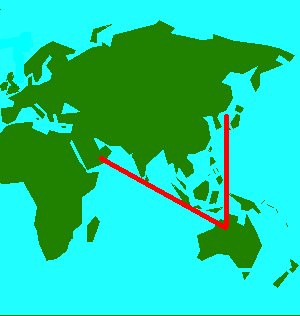 In keeping with the global power shift to the Far East, our most important Anglo ally is becoming Australia. They play a similar role to Britain, being a staunchly loyal and capable base off of Southeast Asia. Australia is not necessarily a powerhouse nation with only 20.3 million people, an economy of $640 billion, and a military budget of $17.8 billion. They rank around 15th in global power, or in the range of South Korea and Spain. What makes Australia so important is her location, excellent (if smallish) military, and relative power superiority in Southeast Asia.
In keeping with the global power shift to the Far East, our most important Anglo ally is becoming Australia. They play a similar role to Britain, being a staunchly loyal and capable base off of Southeast Asia. Australia is not necessarily a powerhouse nation with only 20.3 million people, an economy of $640 billion, and a military budget of $17.8 billion. They rank around 15th in global power, or in the range of South Korea and Spain. What makes Australia so important is her location, excellent (if smallish) military, and relative power superiority in Southeast Asia.I do not mean to sound belittling when I say Australia is mostly valuable for her location. The extreme difference in power between the United States and every other country in the world (with the possible exception of Japan) means that the most important asset of any of our allies is their location. There are many regional and global benefits to Australia’s location. Bases in Northern Australian (such as at Darwin) are great locations from which to launch operations throughout terrorist infected Southeast Asia. Australia’s location is also at the corner of the "V" formed by the ocean off the southern and eastern sides of Asia. As this map shows:

This means forces deployed there would be able to deploy as far a field as the Mideast, South Asia, and Northeast Asia in a reasonable amount of time. Add to this the central role in global spying and intelligence gathering Australia plays (as the Echelon program attests), and it is clear that Australia is a very valuable ally for all the most important regions.
A point that cannot be overlooked when examining Australia is the fact that her military is one of the few remaining militaries that can conduct offensive operations with us (in stark contrast to say, France and Germany). Although Australia only has 53,000 soldiers, they are amongst the best funded in the world at $335,000 per soldier. Much of the $17.8 billion defense budget is going to ensuring that Australia can, after falling behind a little, continue to work closely with the U.S. Billions upon billions are being spent to purchase Aegis destroyers, amphibious warships (essentially light aircraft carriers), F-35, and possibly F-22, fighter planes, large transport and refueling planes, and M1 tanks. Though the numbers are small compared to the U.S., 3 Aegis warships vs. 84, 100 F-35’s vs. ~2,800, 59 M1’s vs. ~1,600, they would be a valuable addition to any operation. In fact, compared to other countries in the world, this amount of deployable power is far above that of many much more powerful nations, much less those of Southeast Asia.
Australia is, unlike India, already very close to the U.S. We have an alliance through the ANZUS Treaty, Australia participates in the National Missile Defense program, they took part in both the Iraq War and occupation, and we have joint intelligence gathering and sharing. Our focus should be more on improving our alliance with a nation that is both ideally located and one of the last nations to be capable of operating with us militarily. As with Japan and India, this is exactly what the Bush administration has been doing. Of greatest significance, Bush has upgraded our alliance to the same level as Great Britain, a true honor. The President has made Australia one of the few countries with a free trade agreement with the U.S. (given how hard it is to get an FTA through Congress you could say that is a true honor also). We should also continue to not overreact to any ties between Australia and China. If there is any trouble in the future with China, Australia will side with us. There is no need angering them by trying to stop business deals between them and China now. I do not believe furthering our ties with Australia have conflicted with any of our European alliances for now. However, Australia is so important to us and the future power politics of Asia that we cannot let Europe come between us.

No comments:
Post a Comment